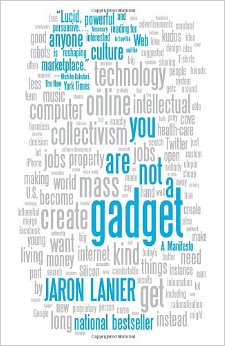Book Notes
 Jaron Lanier, You Are Not a Gadget: A Manifesto (New York: Knopf, 2010), 211pp.
Jaron Lanier, You Are Not a Gadget: A Manifesto (New York: Knopf, 2010), 211pp.
Jaron Lanier once described himself as a "weird outsider." He was born in New York City, but grew up in rural New Mexico. He entered college at age thirteen but never finished a degree. His waist-length dreadlocks, ample girth, and high-pitched voice give him a guru demeanor. He's an artist, musician and composer who has a world class collection of rare instruments. In 2010 Time Magazine named him one of the 100 most influential people in the world.
For over thirty years Lanier has pioneered all sorts of computer technology. Back in the 1980s he was one of the inventors of virtual reality, and "one of the merry band of idealists." Which is to say that he has impeccable geek cred. In this manifesto, though, he explains how his early "sweet faith" in the internet revolution has turned sour, and why he is mostly a "humanist softie." His target is what he calls the new religion of "cybernetic totalism."
Lanier contrasts "the lifeless world of pure information" with the rich mystery of being human. He defends human intelligence, judgment, and artistic creativity against the pseudo-wisdom of computer algorithms, search engines, and aggregators. Information technology, he says, is necessarily a form of social engineering, and the results have been horrible. His book contains dozens of examples, but they are "really just different aspects of a singular, big mistake. The deep meaning of personhood is being reduced by illusions of bits."
Facebook has given us fake friends. Google gives us free stuff, but by linking search with advertisement the user is really the used who has become the product. YouTube is little more than a platform for "juvenilia." Gadget fetishism is everywhere. These are spiritual failures that degrade us, and they lead to all sorts of bad behavior. A very few people have made millions on the internet, but for the vast majority Lanier says it's been a "disaster." In sum, "cybernetic totalism has been bad for spirituality, morality, and business, resulting in a creeping degradation of our own qualities as human beings."
The New York Times listed You Are Not a Gadget as one of the ten best books of 2010. For Lanier's most recent thoughts about the deleterious impact of internet orthodoxy, see his book Who Owns the Future? (2013). Similar critiques include Evgeny Morozov's To Save Everything, Click Here: The Folly of Technological Solutionism (2013), and the novel by Dave Eggers called The Circle (2013).


